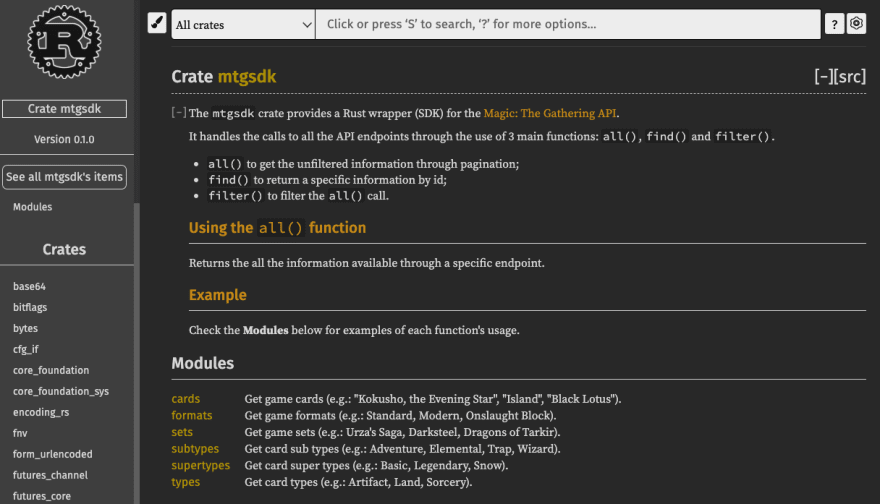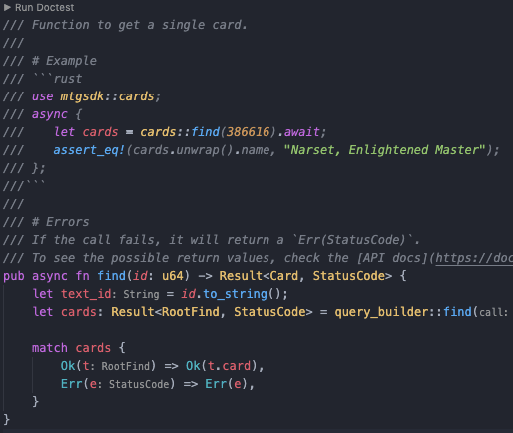42
REST API Wrapper with Rust
TL;DR: This is a post for beginners where I show:
- How I structured the files in the project for better documentation: every file in the same folder;
- How I coded a "query builder" to handle different calls without repeating code: using a generic parameter;
- How I coded test cases within the documentation: nothing special, just remarks on async tests;
- How I created High Order Functions (HOF) to emulate that behaviour we have in Rust's Option and Iterator, for example: created a struct with functions that return the struct itself;
- How I used serde to deserialize the Json: nothing special, just some extra remarks;
- How I tested it as if it were a crate without exporting it to crates.io: just add the lib.rs in the dependencies of the new project.
I build a wrapper for the Magic: The Gathering API (an SDK, by their own terms). And I did so because I wanted a personal project that offered the following possibilities:
cards.filter().types("creature").colors("red").name("dragon")...);The reason why I chose the Magic: The Gathering (MTG) API (besides being a MTG nerd) is because it is a very simple API (it has only
GET methods). This is not a tutorial, I will just highlight the interesting choices this endeavour led me to. Also, this is for beginners; I highly doubt I will say anything new to someone who had carefully read The Book and Rust by example and toyed with async a little bit (although we never know).
The result can be found here.
I chose the left one for two reasons:
use mtgsdk instead of use mtgsdk::mtgsdk
mtgsdk, which I found is not how the cool kids do it.If you want to see for yourself, fork/download the repository and type cargo doc --open
Maybe the first image and Rust by example is enough to show how each way of doing this is carried out; however, for the sake of clarity, I will say this: If you want the left one, all you have to do is to declare the mods in your
lib.rs. Otherwise, you have to create a folder with your single module name, create a mod.rs file in it and use the mod and pub mod inside it, declaring only the folder name within lib.rs (in this case, lib.rs would only have pub mod mtgsdk;.As I said, this API only has
GET methods, and there's not much to talk about how reqwest handles it, for it is pretty much just passing a URL as you would do in a curl.I am not saying that this is all that reqwest does; it is not. I am saying that for this API we don't actually need anything else that accessing the URL and parsing the Json (more on this later).
However, instead of repeating the
reqwest::get(url) inside every module, I created a query builder that receives an url and returns a Result<T, StatusCode> where T is a struct containing the data for the various calls (cards, formats, etc.). Besides allowing me to maintain the usage of reqwest in a single spot, it also allowed me to handle the errors and just send
StatusCode, so the developer using this crate would easily handle the errors. Here is the code with some additional comments.async fn build<T>(url: String) -> Result<T, StatusCode>
where
//This is a requirement for Serde; I will talk about it below.
T: DeserializeOwned,
{
let response = reqwest::get(url).await;
// I am using match instead of "if let" or "?"
// to make what's happening here crystal clear
match &response {
Ok(r) => {
if r.status() != StatusCode::OK {
return Err(r.status());
}
}
Err(e) => {
if e.is_status() {
return Err(e.status().unwrap());
} else {
return Err(StatusCode::BAD_REQUEST);
}
}
}
// This is where de magic (and most problems) occur.
// Again, more on this later.
let content = response.unwrap().json::<T>().await;
match content {
Ok(s) => Ok(s),
Err(e) => {
println!("{:?}", e);
Err(StatusCode::BAD_REQUEST)
}
}
}Pretty straightforward: the functions calling the
build() function will tell which type T corresponds to, a type that will be a struct with the Deserialize trait so that reqwest's json() can do the heavy lifting for us.The documentation section in the Rust Book is pretty good. Besides reading that, I only checked some examples of how documentation is managed in the crates I use.
That this test will be executed is something that The Book talks about, so I will not stress about it. What was specific for me is that I was testing
async calls, which required two minor tweaks:await?, because it returns the error).I will not lecture about HOF, let alone explain anything about functional programming. The reason I ended up with this is because, instead of something like this Builder Pattern (this is from another wrapper for the same API)...
let mut get_cards_request = api.cards().all_filtered(
CardFilter::builder()
.game_format(GameFormat::Standard)
.cardtypes_or(&[CardType::Instant, CardType::Sorcery])
.converted_mana_cost(2)
.rarities(&[CardRarity::Rare, CardRarity::MythicRare])
.build(),
);
let mut cards: Vec<CardDetail> = Vec::new();
loop {
let response = get_cards_request.next_page().await?
let cards = response.content;
if cards.is_empty() {
break;
}
filtered_cards.extend(cards);
}
println!("Filtered Cards: {:?}", filtered_cards);...I wanted something like this:
let response = cards::filter()
.game_format("standard")
.type_field("instant|sorcery")
.cmc(2)
.rarity("rare|mythic")
.all()
.await;
println!("Filtered cards: {:?}", response.unwrap());Why? Because as a developer I love how
Option and Iterator, as well as crates such as warp, implement this, giving Rust its "functional flavour".The function
filter() returns a struct called Where that has a vector where I keep all the filters that are going to be added.pub struct Where<'a> {
query: Vec<(&'a str, String)>,
}
pub fn filter<'a>() -> Where<'a> {
Where { query: Vec::new() }
}So, when I do something like
response = mtgsdk::card::filter(), the variable response is a Where struct, and that allows me to call any function implemented inside Where, e.g.:impl<'a> Where<'a> {
pub fn game_format(mut self, input: &'a str) -> Self {
self.query.push(("gameFormat", String::from(input)));
self
}
}So basically, when I called
filter() and then added the functions game_format(), type_field(), cmc() and rarity() I was doing this:Where struct with filter()
game_format() implemented inside Where, which returned the same Where
type_field() from the Where returned by game_format()
cmc() from the Where returned by type_field()
rarity() from the Where returned by cmc()
all() from the Where returned by rarity() which finally returned the vector of cards:
pub async fn all(mut self) -> Result<Vec<Card>, StatusCode> {
let val = self.query.remove(0);
let mut filter = format!("?{}={}", val.0, val.1);
for (k, v) in self.query.into_iter() {
filter = format!("{}&{}={}", filter, k, v);
}
let cards: Result<RootAll, StatusCode> = query_builder::filter("cards", &filter).await;
match cards {
Ok(t) => Ok(t.cards),
Err(e) => Err(e),
}
}And that's it.
As promised.
#[derive(Default, Debug, Clone, PartialEq, Serialize, Deserialize)]
#[serde(rename_all = "camelCase")]
pub struct Set {
pub code: String,
pub name: String,
#[serde(rename = "type")]
pub type_field: String,
#[serde(default)]
pub booster: Vec<Booster>,
pub release_date: String,
pub block: Option<String>,
pub online_only: Option<bool>,
pub gatherer_code: Option<String>,
pub old_code: Option<String>,
pub magic_cards_info_code: Option<String>,
pub border: Option<String>,
pub expansion: Option<String>,
pub mkm_name: Option<String>,
pub mkm_id: Option<u32>,
}Few things I want to mention:
#[serde(rename_all = "camelCase")] is not sufficiently self-explanatory, it will allow a struct field like release_date to receive data from a field that the API calls releaseDate;- Using Option, which I preferred because in this case the developer using the crate will have absolute certainty if the field wasn't (the Option will be
None) sent or if it was just empty (it will meSome) - Using
#[serde(default)], which I used for the mandatory fields because in these cases there's no doubt that the API sent them.
I wanted to import it in a new project, but I didn't wanted to send it to crates.io. How to do it? Like this:
In the new project's
Cargo.toml I added this:[dependencies]
mtgsdk = { path = "../mtgsdk" }
tokio = { version = "1", features = ["full"] }And that's all. In my
main.rs I just used it as if it was a crate.use mtgsdk::cards;
#[tokio::main]
async fn main() {
let result = cards::find(46012).await;
if let Ok(card) = result{
println!("{}", card.name)
};
}This might be helpful if you want to be truthful to what The Book calls integration testing.
See ya 🙃
Cover image by Wayne Low
42




